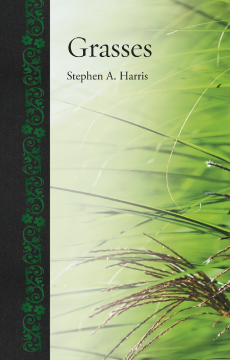
Additional Information
Book Details
Abstract
Most people have memories of playing on well-manicured lawns or running across the flat green surface of a local park, but we often don’t think of grasses as something we consume. Indeed, grasses include four species—wheat, rice, maize, and sugar—that provide sixty percent of human calorie intake, and we become more and more dependent on these as the world’s population increases. In this book, Stephen Harris explains the history of our relationship with these vital plants from the end of the last Ice Age to the present day.
Combining biology, sociology, and cultural history, Grasses explores how these staple crops bear the mark of human influence more visibly than any other plant and how we, in turn, are motivated to protect green space such as public parks. Harris describes this symbiotic connection against the background of climate change, contending that humans must find a way to balance their need for grass as food, as living space, and potentially even as fuel. Providing an impressive exploration of the profound impact these plants have on our survival and our pleasure, this well-illustrated book is a must have for gardeners, foodies, and environmentalists.
“Grasses provides the reader with scientific information about the history and development of the four species of grass: wheat, rice, maize, and sugar. There are also fascinating stories relating to their use and misuse over the centuries. With a population explosion and the problems related to climate change, it is vital that we learn from the past in order to maintain a proper balance. This book should serve as a wake-up call to those of us who may have thought of grasses as only the lovely green covering in lawns and parks.”
— Chicago Botanic Garden
“This delightful hardback, with its thick, glossy pages, beautiful binding, and thoughtful imagery, will open your eyes to the fascinating world of grasses. Reading through, you are struck by the fact that grasses seem to permeate every aspect of modern life, without us really acknowledging their presence. . . . A book full of things you never even imagined you needed to know, but which linger in the imagination long after reading.”
— Garden Design Journal
“Those of us who despair of garden writing being reduced to picture captions or to 140-character long snippets can raise a cheer for the appearance of two new books in Reaktion Books’ Botanical series, a compelling collection that allows knowledgeable writers to explore the social and cultural impact of plants alongside their botanical and horticultural significance . . . Grasses is an absorbing description of Poaceae and other grass-like plants. . . . the books are well-produced, each illustration and photograph is carefully chosen and illuminates the text. . . . Both books are magnificent works: breathtaking in their sweep and dazzling in their research and reflection. More like this please.”
— Gardens Illustrated
Stephen Harris is the Druce Curator of the Oxford University Herbaria and a University Research Lecturer at Green Templeton College, Oxford. He is the author of many books, most recently Planting Paradise: Plants in Cultivation (1502–1900).
